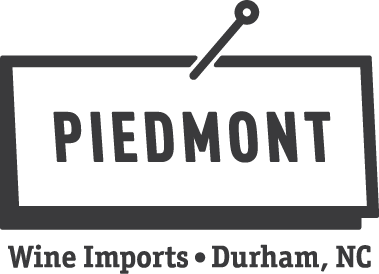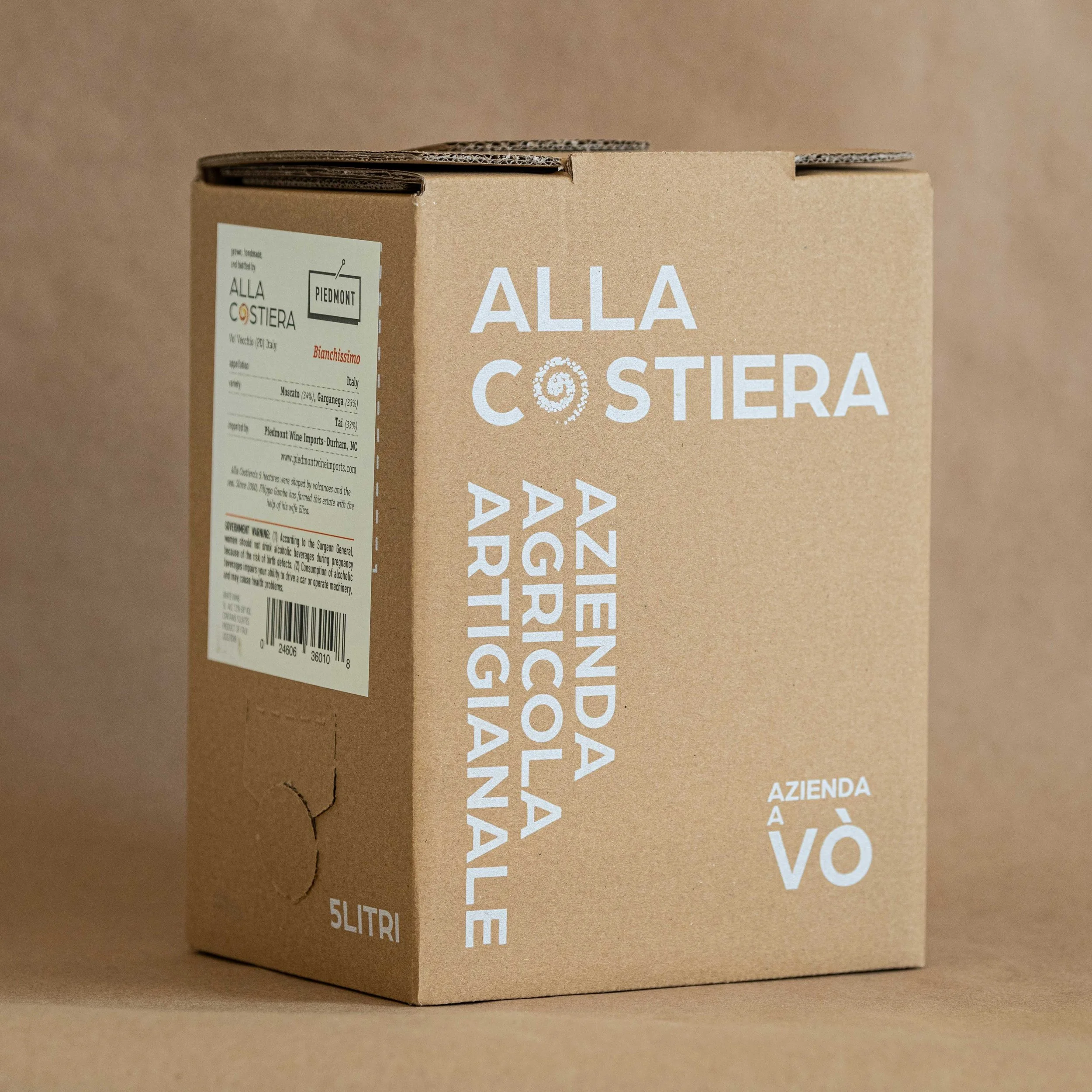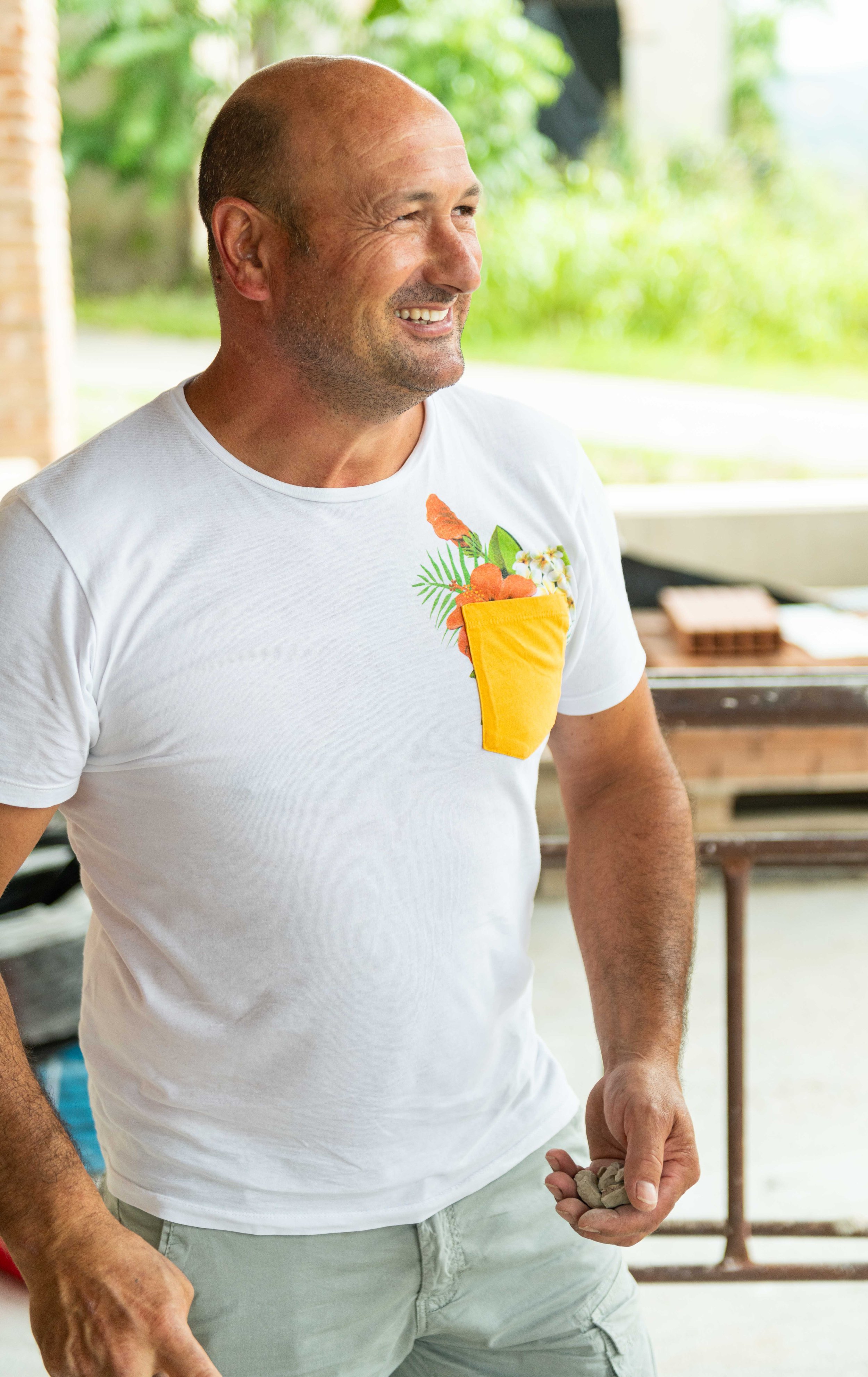






















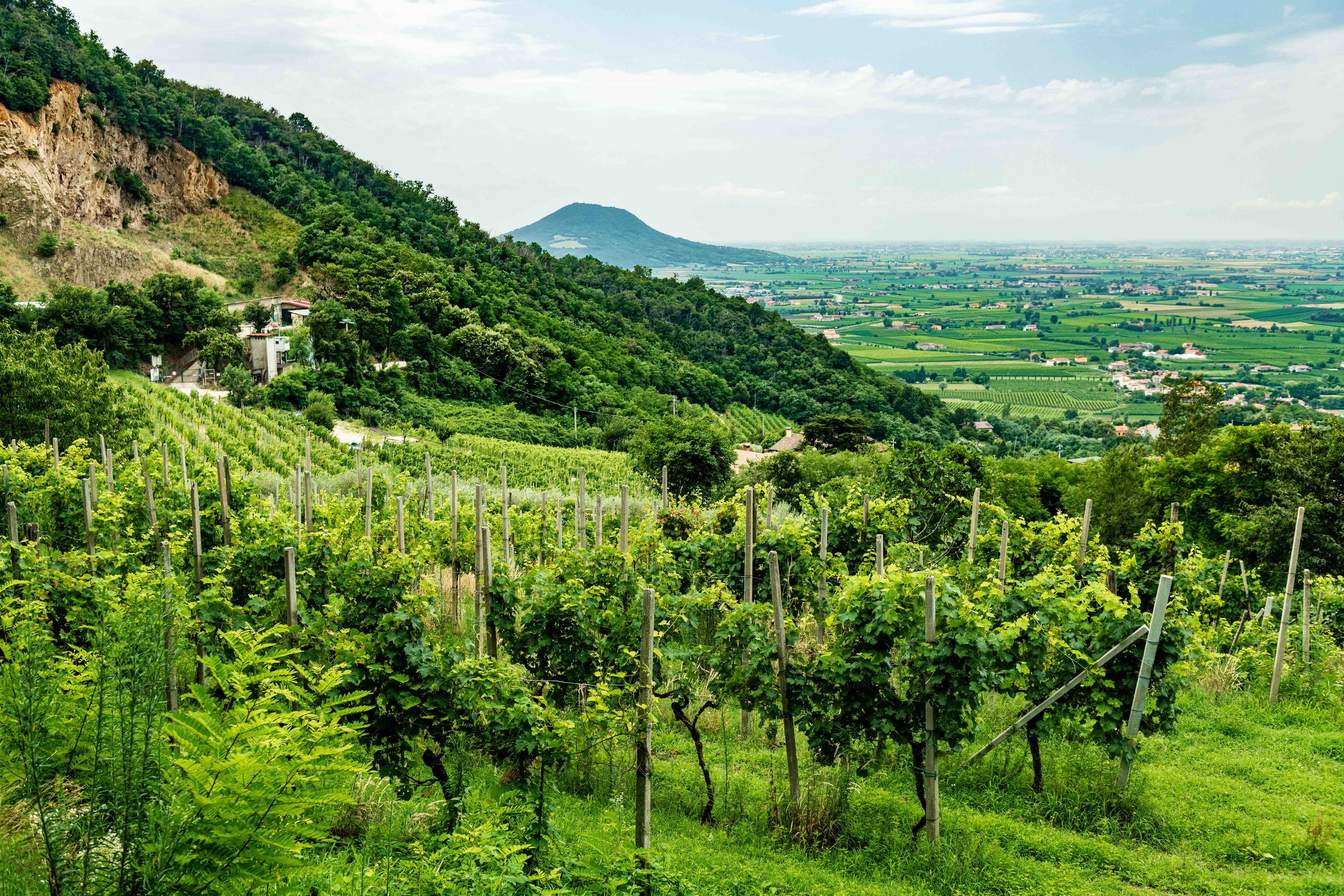



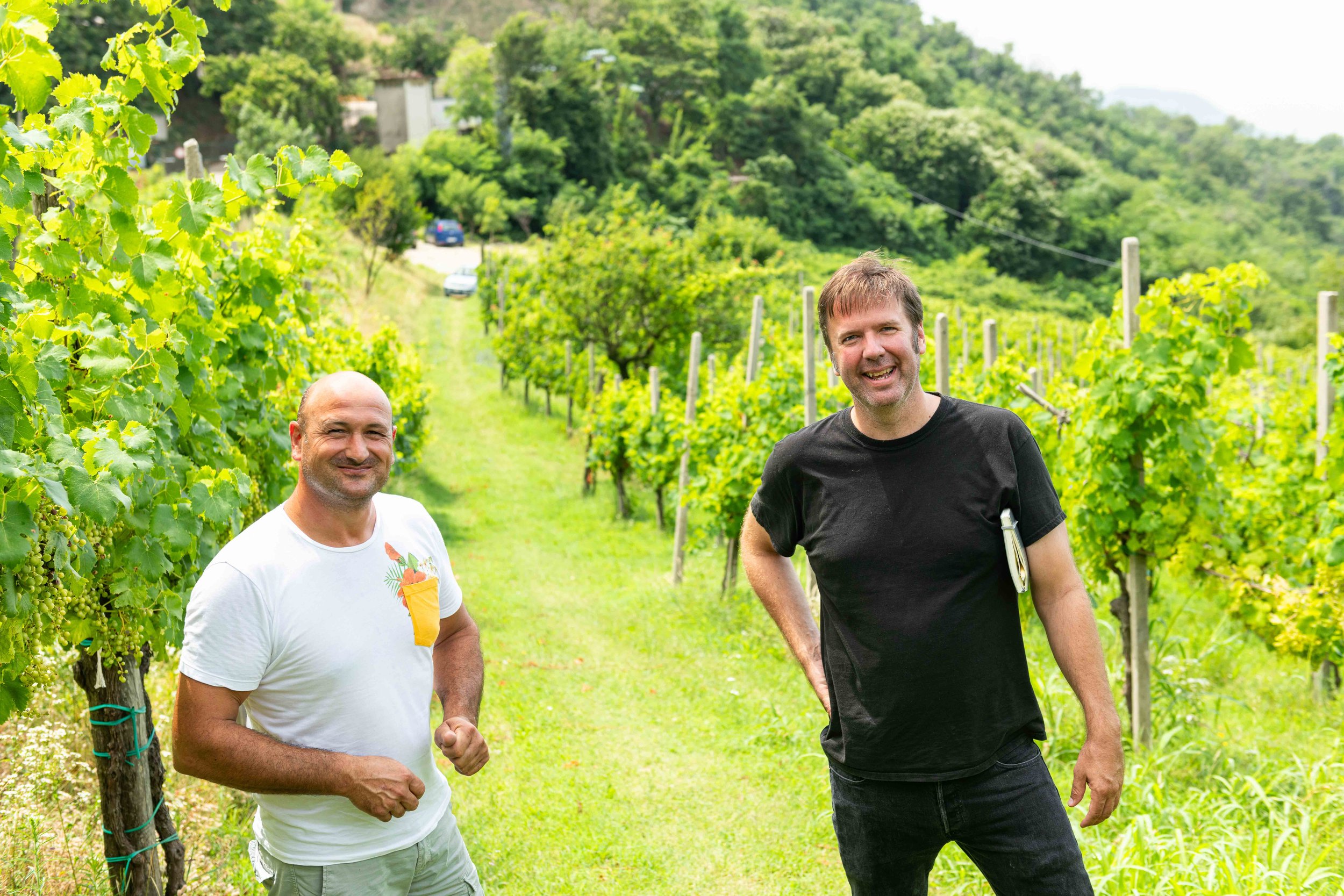




Alla Costiera
Who: Filippo Gamba
Where: Vo’ Euganeo, Padova (Veneto, Italy)
What grapes: Friulano, Moscato Giallo, Garganega, Serprino, Raboso…
Key facts: For over two decades, Filippo Gamba has farmed the land he grew up on according to the principles of healthy, natural viticulture.
Website: https://allacostiera.it
Instagram: @allacostiera.gambafilippo
Alla Costiera Prosecco DOC
Viticulture: Certified organic
Soil type: Calcareous and volcanic
Elevation: 20m
Grapes: 100% Glera
Method of fermentation: Charmat Method Second Fermentation, 60 day elevage before bottling.
Bottles made: Vintage dated Prosecco made in 3,000 bottle batches.
Elderflower. Honey. Orange. As vintages pass, the fruit/floral magic Filippo Gamba conjures becomes stronger. This wine is ebulient. — JM
5L bag in box
Alla Costiera “Bianco Costiera” Vino Bianco
Viticulture: Certified organic
Soil type: Calcareous and volcanic
Elevation: 20m
Grapes: Equal parts Tai, Garganega, Moscato
Method of fermentation: 25 day spontaneous yeast fermentation in enamel-lined cement tank. Unfiltered & unfined.
Hazy. Dry. Floral. The white is made from Tai (Friulano) Garganega and Moscato grapes, very much in the same manner as the rosso. Twenty five day fermentation powered by wild yeast, aged for eight months in enamel-lined cement tank. Spontaneous malo. Unfiltered. Four and a half grams-per-liter of total acidity. Alla Costiera means “to the coast” and this is a must-have natural wine for summer’s beach excursions, and the locally caught seafood you’ll consume, and hopefully even haul home, after soaking in North Carolina’s hundreds of miles of beautiful seashore. — JM
Alla Costiera “Terreni Bianchi” Veneto IGT
Viticulture: Certified organic
Soil type: Calcareous and volcanic
Elevation: 20m
Grapes: Garganega, Marzemina Bianca, Moscato
Method of fermentation: The grapes macerate on the skins for four days in enamel tank. Wild yeast fermentation, unfined and unfiltered.
Apricots. Delicacy. From vines grown in the colli Euganei’s marine white soils. The vines are co-located in a small “cru” of the estate.
Alla Costiera “Rosso Costiera” Vino Rosso
Viticulture: Certified organic
Soil type: Calcareous and volcanic
Elevation: 20m
Grapes: 30% Cabernet Sauvignon, 540% Merlot, 30% Carmenere.
Method of fermentation: 25 day spontaneous yeast fermentation in enamel-lined cement tank. Unfiltered & unfined. Aged for 14 months in concrete (with spontaneous malolactic fermentation) and bottled unfiltered with five grams per liter of total acidity.
Blackcurrant. Graceful, light, with space around the pure dark berry flavors. Cabernet and Merlot. These two grapes (particularly the latter) can be ethereal. In Bordeaux, capable hands routinely mingle the duo into perfect forms. Outside of that region, a deft touch is required. Filippo catches the beauty of a timeless pairing. — JM
Alla Costiera “Sui Lieviti” Bianco Vino Frizzante
Viticulture: Certified organic
Soil type: Calcareous and volcanic
Elevation: 20m
Grapes: 80% Glera, 20% Moscato
Method of fermentation: 15 days of spontaneous fermentation then aged in cement for 4 months before bottling. Secondary fermentation in bottle.
In January, a box of samples showed up from Alla Costiera. It was our first chance to try their “col fondo” stateside, and it knocked PWI’s collective socks right off. Shoulda started importing this one years ago! This is why travel is important. I’m going to make up for lost time by drinking more than my fair share of this leesy, bright, perfectly dry bubbly between now and when Mandy pries the last precious bottle from my greedy, soft hands. What can I say? She’s stronger than me #mandymagic. I don’t work. — JM
Alla Costiera “Sui Lieviti” Rosa Vino Frizzante
Viticulture: Certified organic
Soil type: Calcareous and volcanic
Elevation: 20m
Grapes: Raboso
Method of fermentation: 15 days of spontaneous fermentation then aged in cement for 4 months before bottling. Secondary fermentation in bottle.
Tart strawberry. Toast. Shiso leaf. Bone dry, lightly frizzante on the palate, a mellow col fondo style. With aeration it becomes exuberantly fruity, yet still dry. The finish is mineral: very precise. Alla Costiera’s pale faded pink version of col fondo is captivating. The formula? Certified organic agriculture, small batch winemaking, a dedication to utilizing the most articulate grapes of Filippo and Elisa’s native colli Euganei. It’s inspiring to watch already accomplished winemakers growing their offerings in new directions. — JM
July 2021
When I arrive, Filippo Gamba is in the courtyard in front of their newly expanded cellar. With his sister, and a cute dog. Both work at the farm. Filippo’s wife Elisa, with whom I generally correspond, is at the beach with the couple’s young children. I was sad to miss her, but Elisa’s absence gave me a chance to talk more with her (at-times) shy husband.
Construction has been underway for a year at the estate. They are building a modest, attractive tasting room and event space. It’s a project born of the inertia of Covid lockdown. The cellar is small, though expanded from the time of my first visit in 2013. We still taste wines in Gamba’s little administrative office, a space that’s maybe 8’x10’ and no different than your bookkeeper’s, other than it contains a fully loaded wine fridge. Maybe your bookkeeper’s has that, too: I don’t judge.
Gamba farms seven hectares immediately surrounding the cellar. There are other unattached parcels as well. It’s a beautiful day, the rain is dutifully holding off so we can tour the farther-flung vineyard sites of Alla Costiera and enjoy the relative bumpy comfort of a farm Fiat with rolled-down windows.
Close to the cellar, Filippo farms very old vines: 80+ year-old Tai (Friulano) Moscato, Garganega, others. The Tai has notably small grapes. Trellising is divided between Cordone speronato, Guyot, and vecchio silvo (I’ve never heard of it) systems, depending on the age of the parcels.
Alla Costiera has vines planted on trachite, a hard rock common in the colli Euganei area, and also on marine calcareous marls. Filippo identifies the soil type on the front label of many of his bottlings, a boon for wine (and geology) nerds.
After hiking through steep, verdant vineyards tucked into woodland, and surveying healthy vines and volcanic landscape that surrounds them, thankfully we make a detour to Ristorante da Antonio, a welcoming spot set among the rolling hills. Unsurprisingly, Filippo seems to know everyone inside the place, including the proprietor. Immediately we devour two giant platters of local prosciutto di montagnana, a meat even more tender and flavorful than hams from the considerably more famous San Daniele DOP. A succession of fresh pastas that would make your nonna cry emerge from the kitchen. Tagliatelle with perfect fresh peas. A noodle akin to slightly wavy bucatini with a meaty, faintly spicy ragu. It’s all too good. I’ll never make fresh pasta in America again. Or maybe even eat it. I’m ruined.
We tasted some wines.
The 2020 Rosa (di Raboso) is lightly frizzante on the palate, a mellow col fondo style. With air, it emerges from faint reduction to become exuberantly fruity, yet still dry. The finish is almost mineral, very precise.
The 2019 Terreni Bianchi is a blend of Garganega, Moscato secco, and Marzemino bianco from Gamba’s marine “white” soils. The vines are co-located in a small “cru” of the estate. The grapes macerate on the skins for four days in enamel tank. The wine is good! Apricots. Delicacy. For me it was the wine of the visit.
The 2019 Trachite bianco is made using Pinella and Moscato secco. It macerates on the skins for seven days. The wine would be great with carne cruda.
The 2019 Biancone is made from the 80-year- old vine Tai/Friulano bordering the cantina. It’s a quite tactile wine. Aromatic, plenty of sultana and orchard fruit. But also notably salty. I’d love this with mackerel.
All of Filippo’s reds overperformed at lunch. We probably won’t import the bunch, so I’ll hold off on detailed notes today. I’m confident I’ve never had a Veneto Merlot that was so clean, fresh, bright, juicy, appealing. The Cabernets also impressed. They were marked by Filippos quiet confidence and mastery of terroir.
Such an amiable man. At the end of the meal clouds rolled in. It was time. I didn’t really want to leave. We import more wine from Alla Costiera than anywhere else on earth, and I don’t get to visit often. Because it isn’t a flashy, lauded spot, it’s easy even for me to forget why the colli Euganei deserves attention. It’s bucolic. A pretty, arable land, near-ish to the sea. A real place, where a quiet, dedicated farmer can make articulate wine.
